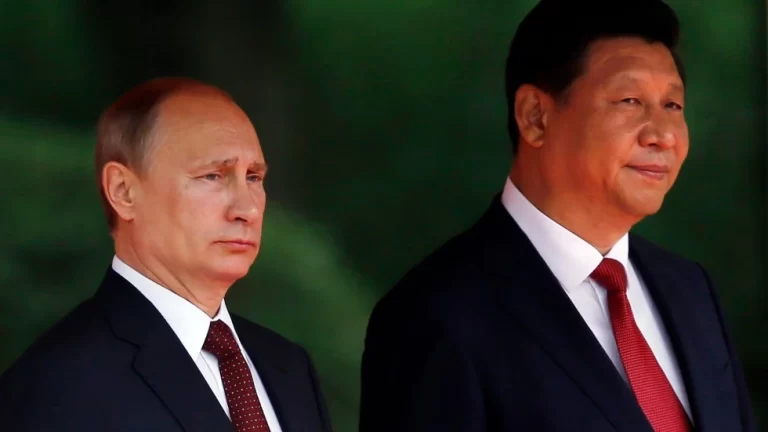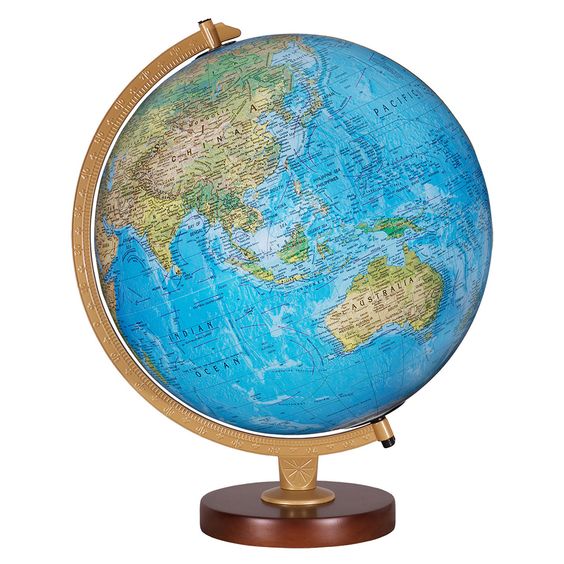
The longer the war in Ukraine drags on the more Putin becomes dependent on China for survival, and the greater price that China will extract.
By Tom Arms
Russia’s dependence on Chinese markets, sanctions busting finance and political support is turning it into a vassal of Beijing.
The bromance between Xi Jinping and Vladimir Putin was unbalanced to begin with. The Chinese economy and population are ten times that of Russia.
Russia is a primary commodity producing country which makes it more susceptible to the economic winds of change should its raw products—mainly grain, gold, oil and gas—drop. China, on the other hand has emerged as an advanced, complex economy which is far more dependent on good relations with its Western markets than on relations with Russia.
The only arena in which the Russians have been perceived to have the upper-hand in the Sino-Russian relationship is in the defense arena. But now that is on the wane. Putin’s litany of Ukrainian failures has severely damaged Russia’s reputation for military prowess.
Nuclear weaponry is the only arena in which Moscow retains an overwhelming advantage with the world’s largest nuclear arsenal. But rest assured that the Chinese are just as worried as everyone else about Putin’s threats to use nukes, and is applying the maximum political pressure to deter him. They will gain nothing and lose everything by allying themselves with a country that uses nuclear weapons to illegally annex another country’s territory.
The one thing holding the Xi and Vladimir together is their mutual suspicion/hatred of the West coupled with a firm belief that the days of Western liberal democracy are numbered and the rise of firm autocratic governments is inevitable. For that reason, China is unlikely to ditch Russia, but it will extract a hefty price for its support.
The question is: What is the price? For a start, Russian oil and gas. Since the 1980s most of Moscow’s energy exports have headed west to Europe. Russia is already redirecting 76 percent of its oil which formerly went to Western Europe. China has upped its annual Russian oil imports by 135,000 barrels daily. But the Chinese—like the Indians—are being offered discount prices to keep them on board. China will demand that they pay even less, and if Russia continues to lock itself out of Western markets than the law of supply and demand will support their case.
The next Chinese target is Siberia and the Russian Far East. The Chinese have never been happy with the Russian presence on their northern border or on the North Pacific coast, especially since the Russian presence there is largely the result of the 1858 “unequal” Treaty of Aigun.
At the height of the European imperial carve-up of China, Russia took advantage of Chinese preoccupation with the Second Opium War and the Taiping Rebellion to pressure the Qing Dynasty into handing over 231,660 square miles of Siberia. That is roughly the size of Ukraine. The terms of Moscow’s diplomatic coup still rankles in Beijing and the importance of the region has increased as climate change has opened access to Arctic natural resources and sea routes. It is perhaps significant that China has taken to describing itself as a “near Arctic” power.
Next is Central Asia—long considered by Russia as the vital stepping stone to a warm water port. Central Asia has been regarded as an integral part of the Russian Empire since the Tsar’s troops conquered the region in the 19th century. There are large ethnic Russian populations in all of the now independent Islamic republics, major oil deposits and Russian military bases. China, however, wants to be dominant power in order to gain access to the region’s resources and re-establish the traditional Silk Road route.
The longer the war in Ukraine drags on the more Putin becomes dependent on China for survival, and the greater price that China will extract.
 World Review
World Review
- The freshly minted British Conservative government of Liz Truss is on the ropes. They have only themselves to blame. The “mini-budget” of Chancellor Kwasi Kwarteng has plunged the economy into a downward spiral. The pound is plummeting. Interest rates are rocketing. People are literally on the cusp of losing their homes, and the problems of the world’s fifth largest economy is having a knock-on effect around the world. The Opposition Labour Party has soared to a 20-point lead in the opinion polls. The Truss-Kwarteng policy of borrowing billions to cut taxes in the middle of a recession has been totally rejected by the markets. One reason for the traders’ emphatic thumbs down is Kwarteng’s refusal to support his budget with an assessment by the independent Office of Budget Responsibility (OBR). Such support is usually a pre-requisite for any budget announcement. The market has interpreted its absence as a sign that the chancellor knew that the OBR would refuse its seal of approval. Well, now the House of Commons Treasury Select Committee, has demanded that Kwarteng organize a retrospective OBR report by the end of October at the latest—and, if the OBR report is as scathing as the statements emitting from the corridors of the Bank of England and the International Monetary Fund— amend the budget accordingly. In the meantime, the Truss-Kwarteng duo are doing what every politician does these days when caught in a mess of their own making—doubling down and blaming someone else. In this case Ms. Truss has hummed and hahed through a series dramatically misjudged local radio interviews. Putin, Ukraine, covid and world energy prices—everything except Brexit—were blamed for the reaction to the budget. But the fact is every other developed country has the same problems (except self-inflicted Brexit) and they have succeeded in propping up their troubled economies. The markets, therefore, have decided that Britain’s problems can be ascribed to political competence.
- Who blew up the Baltic Sea gas pipe lines on Tuesday? And who is the legal victim? It is almost universally agreed that the explosions were sabotage that involved a state military operation. But which state? Officially neither the Russians nor NATO are pointing a finger, but both are implying that the other is responsible. Sweden said it detected Russian submarines and surface vessels in the sabotage area shortly before the explosions. Russia retorted with a claim that there were even more NATO naval forces in the neighborhood. Furthermore, the UN Security Council meeting to discuss the issue has been called by Moscow. The identity of the attacker is important because the attack occurred in Danish territorial waters which means that it can be construed as an attack on a NATO member. On the other hand, it was an attack on Russian property and so Moscow might be able to claim that it was a NATO attack against them. It is quite possible that we will never know who was responsible because revealing the identity would further escalate the Ukraine War. In the meantime, gas from the pipeline continues to bubble to the surface and into the atmosphere at a disturbing rate. The gas is mainly methane which is the second biggest cause of climate change after CO2. EU Energy Commissioner Stefano Grassi said the leaks risked becoming a “climate and ecological disaster.”
- Meanwhile, it looks like being another crunch week for the Ukraine War. On Tuesday or Wednesday the rubber-stamp Russian Duma is expected to confirm the Putin’s annexation of 15% of Ukrainian territory following a series of sham referendums. This means that if Ukraine continues to fight for their return, Russia will regard it as an attack on Russian territory which, according to President Vladimir Putin, which will be defended “by all means possible.” This has been widely interpreted as a threat to use nuclear weapons. The annexation, nuclear threat, pipeline explosions, energy crisis and more sanctions will all be discussed at an EU heads of government summit on Wednesday. President Biden, meanwhile, has said that the US “will never accept” the Russian annexation of Ukrainian territory. He is reported to be considering fresh sanctions aimed at the Russian technology sector, especially parts related to the financial and oil industries.
- Fleeing Russian soldiers have proved a bonus to the Ukrainian forces as they have left behind valuable equipment as well as vacating Ukrainian territory. Much of the equipment can be recycled and used against the Russian invaders, but more importantly, it can be examined and mined for valuable military intelligence which is, of course, passed onto Ukraine’s Western backers. A case in point is the recent capture of a state-of-the-art T-90M tank after a battle outside Kharkiv. The Ukrainians have only managed to acquire one, but that will be enough to learn how to counter its deadly attack potential. The tank is known to have a protective cape to deflect radar and heat-seeking anti-tank missiles. It is also equipped with short-range projectiles to repel missile attacks and has specially hardened armour. All of this is known. What is not known is what and how of these attributes. Military scientists will know soon enough.
- Brazilian voters troop to the polls on Sunday in a spirit of trepidation. Will their votes count or will Jair Bolsonaro do a Trump, dismiss the results as an “electoral lie” and go the extra mile with a military coup? Sunday’s vote is a first-round poll of 11 candidates, but opinion polls indicate that the final choice on 30 October run-off will be between Bolsonaro and former left-wing president Luiz Inacio da Silva (aka “Lula”). The predicted landslide winner of round two is Lula. Bolsonaro has told his supporters—mainly the military—to standby in case the vote goes against him. “If necessary,” he has warned, “we will go to war.”
- The hijab rebellion continues in Iran. The latest death toll has topped 100 and there have been over 1,200 arrests. There have been many demonstrations and riots in Iran since it became the Islamic Republic in 1979. But the current violence appears to the biggest threat yet to mullah rule. The response of hard line president Ebrahim Raisi has been to double down. “Chaos,” he said this week, “will not be accepted.” His threats and arrests appear to have failed—at least for the time being. Past riots have been mostly related to the country’s economic problems, such as the demonstrations that followed a petrol pump price rise. The regime managed to escape from that by blaming Western sanctions. The Hijab rebellion is different. It has no scapegoat. It is entirely the creation of the country’s theocratic rulers.
____________
 Tom Arms is foreign editor of Liberal Democrat Voice and current working on a second edition of “The Encyclopedia of the Cold War.” He is also the author of “America Made in Britain.”
Tom Arms is foreign editor of Liberal Democrat Voice and current working on a second edition of “The Encyclopedia of the Cold War.” He is also the author of “America Made in Britain.”